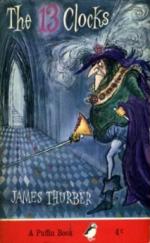|
This section contains 206 words (approx. 1 page at 300 words per page) |

|
As in many of his stories, including his fairy tales, Thurber here responds to the many aspects of modern culture that threaten love and imagination. He traces unrestrained desires for power and material wealth to their roots in an impossible desire for immortality. Though the tale contains little that explicitly makes this connection, Thurber points to it in his foreword. He implies that this book did not begin as a commercial venture and that as it became of commercial value, it gave him and others more trouble. Nevertheless, its chief value is that it began in a spirit of playfulness and is meant to foster that spirit in readers.
There is little in this tale that is likely to offend young readers or parents. At the end of the foreword, Thurber thanks his wife for waking him out of nightmares, "some of them about the Todal...
|
This section contains 206 words (approx. 1 page at 300 words per page) |

|




